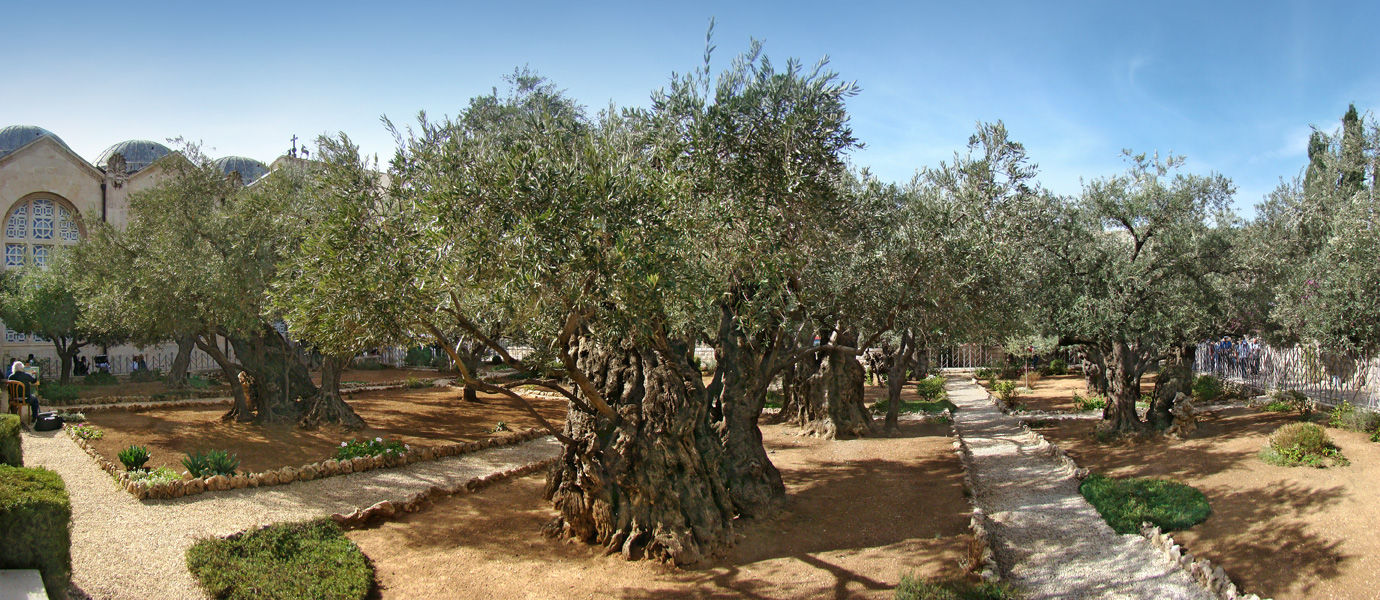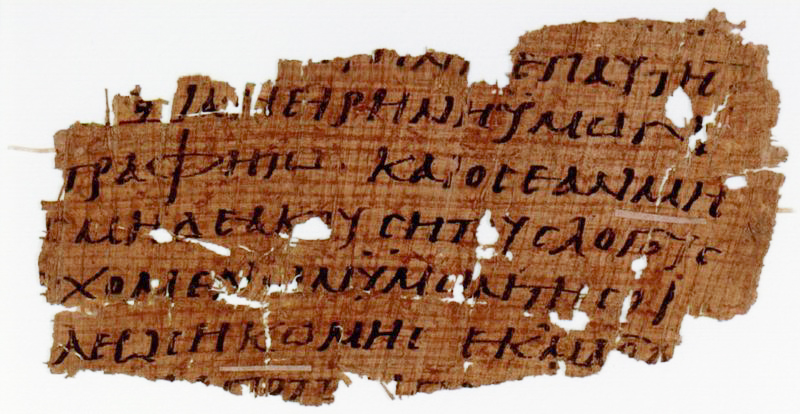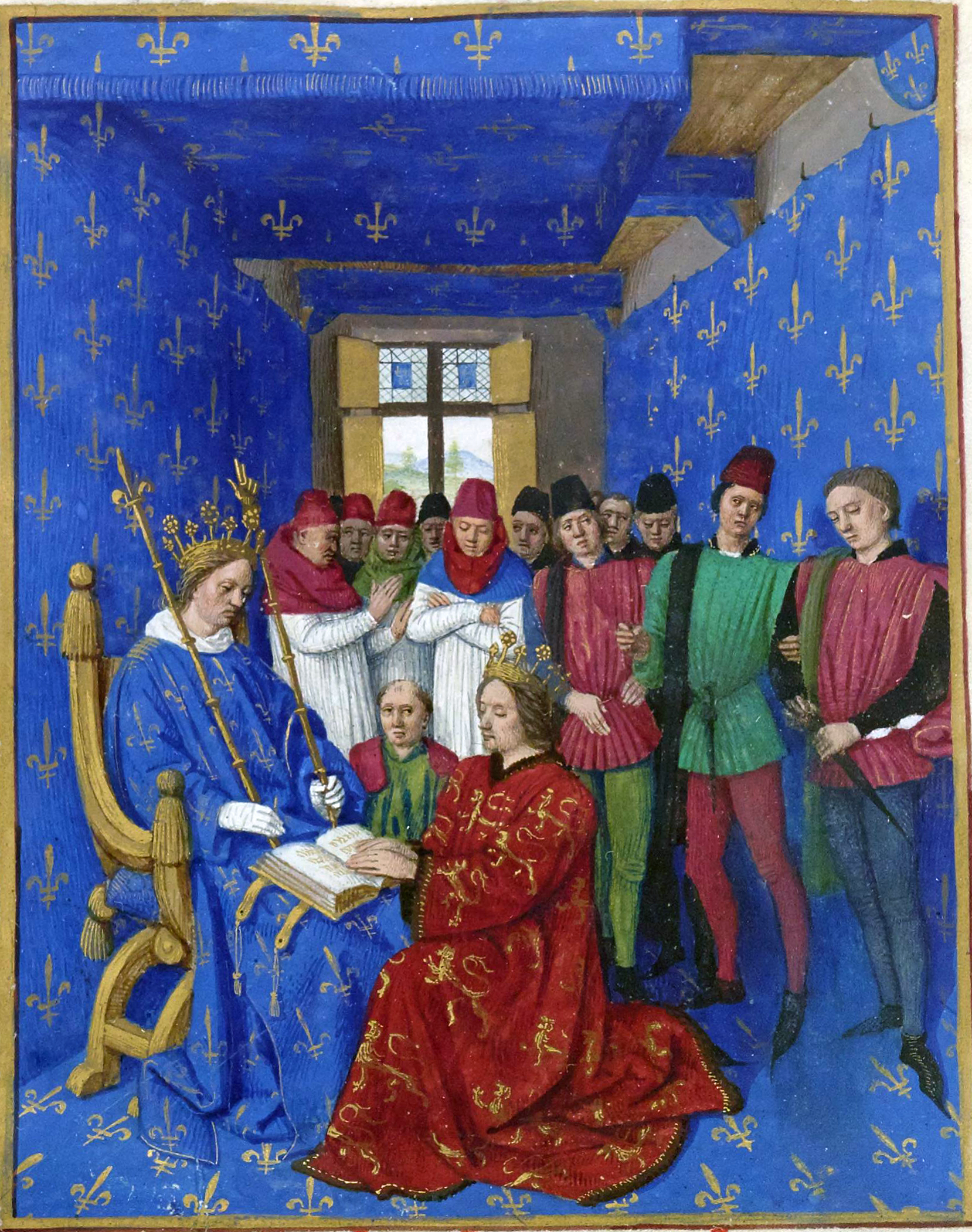|
Sell Your Cloak And Buy A Sword
Sell your cloak and buy a sword is an instruction by Jesus to his disciples during the Last Supper which has been interpreted in several ways. Interpretation Fulfillment of prophecy interpretation Christian anarchist Jacques Ellul and Christian pacifist John Howard Yoder do not believe Luke 22:36 overturns the many times Jesus urged his followers to turn the other cheek and not resist evil when confronted by violence during his Sermon on the Mount and years of ministry. They show when the passage is taken in context (Luke 22:36-38), Jesus is also aware of fulfilling prophecy and makes a surprising statement that two swords are "enough." Ellul, Yoder and Archie Penner claim that two swords could not possibly have been "enough" to defend Jesus from his pending arrest, trial and execution, so their sole purpose must have been Jesus' wish to fulfill a prophecy (Isaiah 53:9-12). As Ellul explains: This theory is further substantiated by Peter when Peter draws one of the swords ... [...More Info...] [...Related Items...] OR: [Wikipedia] [Google] [Baidu] |
Jesus
Jesus, likely from he, יֵשׁוּעַ, translit=Yēšūaʿ, label=Hebrew/Aramaic ( AD 30 or 33), also referred to as Jesus Christ or Jesus of Nazareth (among other names and titles), was a first-century Jewish preacher and religious leader; he is the central figure of Christianity, the world's largest religion. Most Christians believe he is the incarnation of God the Son and the awaited Messiah (the Christ) prophesied in the Hebrew Bible. Virtually all modern scholars of antiquity agree that Jesus existed historically. Research into the historical Jesus has yielded some uncertainty on the historical reliability of the Gospels and on how closely the Jesus portrayed in the New Testament reflects the historical Jesus, as the only detailed records of Jesus' life are contained in the Gospels. Jesus was a Galilean Jew who was circumcised, was baptized by John the Baptist, began his own ministry and was often referred to as "rabbi". Jesus debated with fellow ... [...More Info...] [...Related Items...] OR: [Wikipedia] [Google] [Baidu] |
Garden Of Gethsemane
Gethsemane () is a garden at the foot of the Mount of Olives in Jerusalem where, according to the four Gospels of the New Testament, Jesus underwent the agony in the garden and was arrested before his crucifixion. It is a place of great resonance in Christianity. There are several small olive groves in church property, all adjacent to each other and identified with biblical Gethsemane. Etymology ''Gethsemane'' appears in the Greek original of the Gospel of Matthew and the Gospel of Mark as (''Gethsēmanḗ''). The name is derived from the Aramaic (''Gaḏ-Šmānê''), meaning "oil press". and call it (''chōríon''), meaning a place or estate. The Gospel of John says Jesus entered a garden ( ''kêpos'') with his disciples. Location According to the New Testament it was a place that Jesus and his disciples customarily visited, which allowed Judas Iscariot to find him on the night Jesus was arrested. There are four locations, all of them at or near the western foot of ... [...More Info...] [...Related Items...] OR: [Wikipedia] [Google] [Baidu] |
New Testament Words And Phrases
New is an adjective referring to something recently made, discovered, or created. New or NEW may refer to: Music * New, singer of K-pop group The Boyz (South Korean band), The Boyz Albums and EPs * New (album), ''New'' (album), by Paul McCartney, 2013 * New (EP), ''New'' (EP), by Regurgitator, 1995 Songs * New (Daya song), "New" (Daya song), 2017 * New (Paul McCartney song), "New" (Paul McCartney song), 2013 * New (No Doubt song), "New" (No Doubt song), 1999 *"new", by Loona from ''Yves (single album), Yves'', 2017 *"The New", by Interpol from ''Turn On the Bright Lights'', 2002 Acronyms * Net economic welfare, a proposed macroeconomic indicator * Net explosive weight, also known as net explosive quantity * Network of enlightened Women, a conservative university women's organization * Next Entertainment World, a South Korean film distribution company Identification codes * Nepal Bhasa language ISO 639 language code * New Century Financial Corporation (NYSE stock abbreviation ... [...More Info...] [...Related Items...] OR: [Wikipedia] [Google] [Baidu] |
Christian Terminology
Christians () are people who follow or adhere to Christianity, a monotheistic Abrahamic religion based on the life and teachings of Jesus Christ. The words ''Christ'' and ''Christian'' derive from the Koine Greek title ''Christós'' (Χριστός), a translation of the Biblical Hebrew term '' mashiach'' (מָשִׁיחַ) (usually rendered as ''messiah'' in English). While there are diverse interpretations of Christianity which sometimes conflict, they are united in believing that Jesus has a unique significance. The term ''Christian'' used as an adjective is descriptive of anything associated with Christianity or Christian churches, or in a proverbial sense "all that is noble, and good, and Christ-like." It does not have a meaning of 'of Christ' or 'related or pertaining to Christ'. According to a 2011 Pew Research Center survey, there were 2.2 billion Christians around the world in 2010, up from about 600 million in 1910. Today, about 37% of all Christians live in the ... [...More Info...] [...Related Items...] OR: [Wikipedia] [Google] [Baidu] |
Not Peace, But A Sword
Matthew 10 is the tenth chapter in the Gospel of Matthew in the New Testament section of the Christian Bible. This chapter opens with Jesus calling some of his disciples and sending them out to preach and heal. This section is also known as the Mission Discourse or the Little Commission, in contrast to the Great Commission at the end of the gospel ( Matthew 28:18– 20). The Little Commission is directed specifically to the "lost sheep of the house of Israel", while the Great Commission is directed to all nations. The ''Pulpit Commentary'' suggests that Jesus' message in this discourse "was hardly likely to have been remembered outside Jewish Christian circles". Matthew names the twelve apostles, or "twelve disciples", in verses 2 to 4 and gives them careful instruction as they travel around Israel. The remainder of the chapter consists almost entirely of sayings attributed to Jesus. Many of the sayings found in Matthew 10 are also found in Luke 10 and the Gospel of Thomas, which ... [...More Info...] [...Related Items...] OR: [Wikipedia] [Google] [Baidu] |
Beza
Theodore Beza ( la, Theodorus Beza; french: Théodore de Bèze or ''de Besze''; June 24, 1519 – October 13, 1605) was a French Calvinist Protestant theologian, reformer and scholar who played an important role in the Protestant Reformation. He was a disciple of John Calvin and lived most of his life in Geneva. Beza succeeded Calvin as a spiritual leader of the Republic of Geneva, which was originally founded by John Calvin himself. Biography Early life Theodore Beza was born at Vézelay, in Burgundy, France. His father, Pierre de Beze, royal governor of Vézelay, descended from a Burgundian family of distinction; his mother, Marie Bourdelot, was known for her generosity. Beza's father had two brothers; Nicholas, who was member of Parliament at Paris; and Claude, who was abbot of the Cistercian monastery of Froimont in the diocese of Beauvais. Nicholas, who was unmarried, during a visit to Vézelay was so pleased with Theodore that, with the permission of his parents, he ... [...More Info...] [...Related Items...] OR: [Wikipedia] [Google] [Baidu] |
John Gill (theologian)
John Gill (23 November 1697 – 14 October 1771) was an English Baptist pastor, biblical scholar, and theologian who held to a firm Calvinistic soteriology. Born in Kettering, Northamptonshire, he attended Kettering Grammar School where he mastered the Latin classics and learned Greek by age 11. He continued self-study in everything from logic to Hebrew, his love for the latter remaining throughout his life. Early life and education At the age of about 12, Gill heard a sermon from his pastor, William Wallis, on the text, "And the God called unto Adam, and said unto him, Where art thou?" (). The message stayed with Gill and eventually led to his conversion. It was not until seven years later that he made a public profession of faith. Pastoral work His first pastoral work was as an intern assisting John Davis at Higham Ferrers in 1718 at age 21. He became pastor at the Strict Baptist church at Goat Yard Chapel, Horsleydown, Southwark in 1719. His pastorate lasted 51 years. ... [...More Info...] [...Related Items...] OR: [Wikipedia] [Google] [Baidu] |
Unam Sanctam
' is a papal bull that was issued by Pope Boniface VIII on 18 November 1302. It laid down dogmatic propositions on the unity of the Catholic Church, the necessity of belonging to it for eternal salvation, the position of the Pope as supreme head of the Church and the duty thence arising of submission to the Pope to belong to the Church and thus to attain salvation. The Pope further emphasized the higher position of the spiritual in comparison with the secular order. The historian Brian Tierney calls it "probably the most famous" document on church and state in medieval Europe. The original document is lost, but a version of the text can be found in the registers of Boniface VIII in the Vatican Archives. The bull was the definitive statement of the late medieval theory of hierocracy, which argued for the temporal as well as spiritual supremacy of the pope. Background The bull was promulgated during an ongoing dispute between Boniface VIII and King Philip IV of France (Phi ... [...More Info...] [...Related Items...] OR: [Wikipedia] [Google] [Baidu] |
Boniface VIII
Pope Boniface VIII ( la, Bonifatius PP. VIII; born Benedetto Caetani, c. 1230 – 11 October 1303) was the head of the Catholic Church and ruler of the Papal States from 24 December 1294 to his death in 1303. The Caetani, Caetani family was of baronial origin, with connections to the papacy. He succeeded Pope Celestine V, who had papal resignation, abdicated from the papal throne. Boniface spent his early career abroad in diplomatic roles. Boniface VIII put forward some of the strongest claims of any pope to temporal as well as spiritual power. He involved himself often with foreign affairs, including in France, Sicily, Italy and the First War of Scottish Independence. These views, and his chronic intervention in "temporal" affairs, led to many bitter quarrels with Albert I of Germany, Philip IV of France, and Dante Alighieri, who placed the pope in the Eighth Circle of Hell in his ''Divine Comedy'', among the simony, simoniacs. Boniface systematized canon law (Catholic Church), ... [...More Info...] [...Related Items...] OR: [Wikipedia] [Google] [Baidu] |
Jamieson-Fausset-Brown Bible Commentary
The Jamieson-Fausset-Brown Bible Commentary refers to a biblical commentary entitled a ''Commentary Critical and Explanatory on the Whole Bible'', prepared by Robert Jamieson, Andrew Robert Fausset and David Brown and published in 1871; and derived works from this initial publication, in differing numbers of volumes and abridgements. Background Robert Jamieson (1802–1880) was a minister at St Paul's Church, Provanmill in Glasgow. Andrew Fausset (1821–1910) was rector of St Cuthbert’s Church in York. David Brown (1803–1897) was a Free Church of Scotland minister at St James, Glasgow, and professor of theology at Free Church College of the University of Aberdeen. The writers described their work as: : humble effort to make Scripture expound itself. and prayed: :May the Blessed Lord who has caused all holy Scriptures to be written for our learning, bless this ... effort ... and make it an instrument towards the conversion of sinners and the edification of saints, ... [...More Info...] [...Related Items...] OR: [Wikipedia] [Google] [Baidu] |
Live By The Sword, Die By The Sword
"Live by the sword, die by the sword" is a proverb in the form of a parallel phrase, derived from the Gospel of Matthew ( Matthew 26, ): "Then said Jesus unto him, Put up again thy sword into his place: for all they that take the sword shall perish with the sword." Original Biblical quotation The phrase comes from Matthew , in which one of Jesus's disciples is described as having struck the servant of the High Priest of Israel and cut off his ear. Jesus is described as having rebuked him, saying: The saying "all they that take the sword shall perish with the sword" is only found in the Gospel of Matthew and not in any of the other gospels. The Latin version refers to the weapon as a '' gladius'', while the Greek version refers to it as a '' makhaira''. Interpretations According to St. John Chrysostom, when Jesus rebuked the unnamed disciple, it was a lesson that "''The disciples might accept meekly whatever befell him when they had learned that this also is occurring acco ... [...More Info...] [...Related Items...] OR: [Wikipedia] [Google] [Baidu] |
Kohen
Kohen ( he, , ''kōhēn'', , "priest", pl. , ''kōhănīm'', , "priests") is the Hebrew word for "priest", used in reference to the Aaronic priesthood, also called Aaronites or Aaronides. Levitical priests or ''kohanim'' are traditionally believed and halakhically required to be of direct patrilineal descent from the biblical Aaron (also ''Aharon''), brother of Moses. During the existence of the Temple in Jerusalem, ''kohanim'' performed the daily and holiday ( Yom Tov) duties of sacrificial offerings. Today, ''kohanim'' retain a lesser though distinct status within Rabbinic and Karaite Judaism and are bound by additional restrictions according to Orthodox Judaism. In the Samaritan community, the kohanim have remained the primary religious leaders. Ethiopian Jewish religious leaders are sometimes called '' kahen'', a form of the same word, but the position is not hereditary and their duties are more like those of rabbis than kohanim in most Jewish communities. Etymolo ... [...More Info...] [...Related Items...] OR: [Wikipedia] [Google] [Baidu] |







